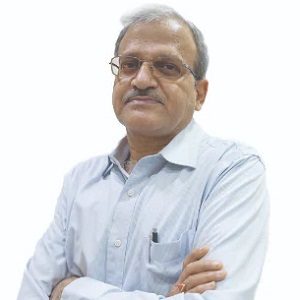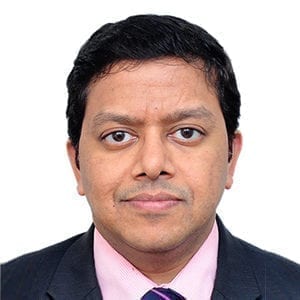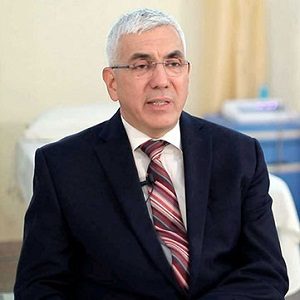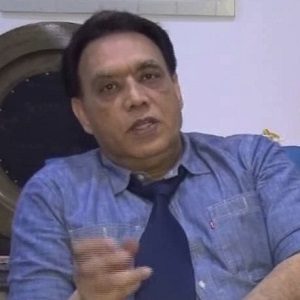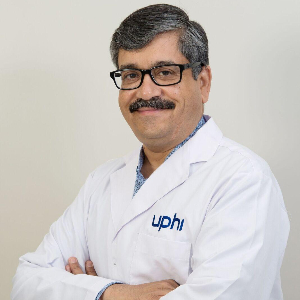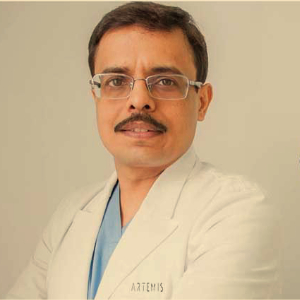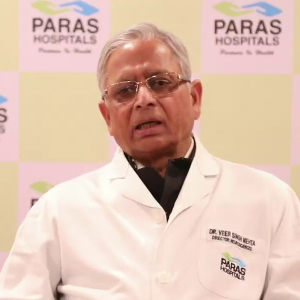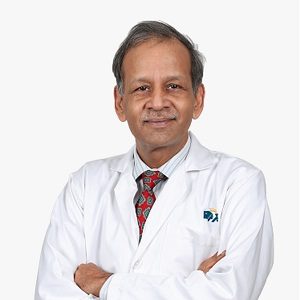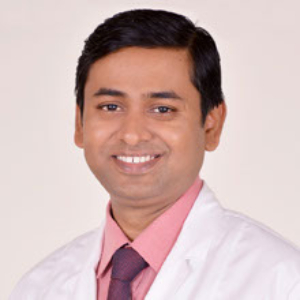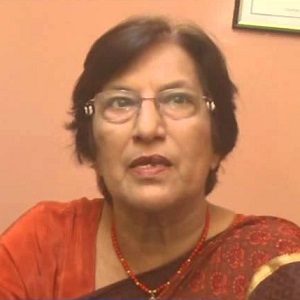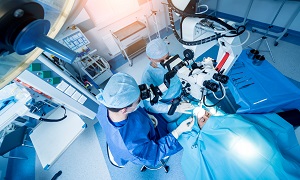Best Stroke surgery Surgeons in India
- Pediatric Neurologist, New Delhi, India
- Over 30 years’ experience
Profile Highlights:
- Dr. Vineet Bhushan Gupta is a renowned pediatric neurologist with nearly three decades of experience in treating neurological disorders in children.
- Currently, he is practicing as a senior consultant at Indraprastha Apollo Hospital, New Delhi.
- Dr. Gupta is a certified fellow in Pediatric Neurology from London and the Pediatric Intensive Care Unit, Alder Hey Children’s Hospital of Liverpool.
- Dr. Vineet Bhushan Gupta specializes in Spinal fusion surgery. He also treats Spondylolisthesis, Epilepsy, pediatric stroke, Disc Desiccation, Spinal Stenosis, Fractured vertebrae, Herniated Disc, Disc Degeneration, Scoliosis, and developmental problems.
- Dr. Gupta has authored numerous research papers and studies that have appeared in a host of medical journals.
- Neurologist, New Delhi, India
- Over 15 years’ experience
Profile Highlights:
- Dr. Puneet Agarwal is one of the renowned neurologists in India known for his outstanding performance in the field of neuroscience.
- He is considered to be one of the first few doctors to successfully complete the Inflammatory Genes study in stroke patients and IV Valproate in status epilepticus.
- Dr. Agarwal is highly experienced in the Management of Parkinson’s disease, Deep Brain Stimulation, and Injection of Botulinum Toxin and is currently functioning as the Director of the Neurology Department of Stroke.
- Neurologist, New Delhi, India
- over 27 years experience
Profile Highlights:
- Dr. Mukul Varma is one of the best Neurologists in India, specialized in treating brain and spine disorders. With over 27 years of experience, the doctor has expertise in Parkinson’s disease, Speech and movement disorder, headache, and multiple sclerosis treatment.
- He is working as a senior consultant Neurologist with the prestigious Apollo Hospital, New Delhi.
- Dr. Varma is excellent at diagnosing and providing holistic treatment for meningitis, brain stroke, epilepsy, brain cancer, and many others. The doctor also performs stereotactic procedures for Brachial Plexus injuries.
- He has contributed 20 literary works to medical journals of national and international repute.
- Neurologist, New Delhi, India
- Over 42 years' experience
Profile Highlights:
- Dr. Anoop Kohli is one of the well-known Neurologists in India, having 42 years of clinical experience.
- He is interested in the treatment of Migraine, Brain Haemorrhage, Paralysis, Parkinson’s disease, Stroke, Paraplegia, Fits, and Meningitis.
- Dr. Kohli is a senior consultant at Apollo Hospital, New Delhi, and a pioneer, who first devised an intravenous thrombolytic treatment and developed the first Trans-Cranial Doppler Lab of India at Apollo Hospitals, New Delhi.
- Dr. Anoop Kohli is excellent at surgical intervention and therapies. He has contributed 40 publications to national and international journals.
- Neurologist, Gurugram, India
- Over 20 years’ experience
Profile Highlights:
- Dr. Sumit Singh is a well known Neurologist in India currently associated with Artemis Hospital in Gurgaon as the Director of the department of Neurology.
- He has an experience of 20+ years and specializes in the treatment and management of headache and movement disorders.
- He is the first Neurologist in India to introduce Botulinium toxin for the treatment of headache in 2002 and also used it for trigeminal neuralgia treatment.
- He has years of knowledge and experience in the treatment of neuromuscular disorders and is one of the best neurologists for the management of patients who have undergone Deep Brain Stimulation surgery.
- Dr. Singh is known to be the best for the planning and management of patients with Parkinson’s disease. He also provides treatment for patients suffering from Multiple sclerosis, Myasthenia gravis and Polymyositis.
- He has been associated with other prestigious hospitals before joining Artemis that includes All India Institute of Medical Sciences where he established the first Headache Clinic in North India. He also had an important role in starting the unit of Neuromuscular Disorders in the hospital.
- A member of esteemed medical societies and associations, he is equally interested in research and has been actively involved in clinical trials for Myasthenia gravis and Multiple sclerosis.
- Dr. Singh has also taught and trained several undergraduate and post graduate students and was a Faculty of Neurology during his stint at AIIMS.
- He holds credit of over 100 publications to his name in world renowned medical and scientific journals and has also authored and co authored several text books on neurology.
- Neurointerventional Surgeon, Gurugram, India
- Over 30 years’ experience
Profile Highlights:
- Dr. Vipul Gupta is one of the most highly experienced and skilled interventional neurologists in India with expertise in AVMs, Intracranial Aneurysms embolization, tumor embolization, and angioplasty.
- He holds the credit of performing over 300 brain AVM procedures and more than 1000 intracranial aneurysms along with 100 DAVF procedures for the endovascular treatment of intracranial aneurysms and arteriovenous malformations.
- Dr. Gupta specializes in stenting of arterial stenosis as well as carotid stenting and intra- arterial thrombolysis for acute stroke. His expertise also lies in neurovascular imaging techniques and procedures.
- Neurosurgeon, Gurugram, India
- Over 38 years’ experience
Profile Highlights:
- Dr. (Prof.) V S Mehta is a leading Neurosurgeon in India and is considered among the best neurosurgeons in the world.
- He holds an experience of over 38 years in the field and is an expert in Brachial Plexus surgery, brain stem surgery, spinal tumor surgery, brain aneurysms, and brain tumor surgery.
- He has been honored with the Padma Shri for his dedication and contributions to neurosurgery and spine surgery in India.
- In Paras Dr. V S Mehta has been part of the team to first use the Image-Guided Brain Tumor Navigation Technology for Brain tumor surgery in India.
- Neurosurgeon, New Delhi, India
- Over 27 years experience
Profile Highlights:
- Dr. Pranav Kumar is one of the best Neurosurgeons in India, having a good success record of over 27 years in performing deep-rooted tumors in the skull.
- Since 1996, Dr. Kumar has been working as a senior consultant neurosurgeon at Apollo Hospital, New Delhi.
- Dr. Pranav Kumar is skilled in surgeries for brain tumors deep-seated at the base of the skull and aneurysms affecting the cerebrovascular system.
- Dr. Kumar specializes in performing the complex ‘Auditory Brainstem Implant,’ where a Bionic device is inserted in the brainstem to recover the hearing capacity in deaf patients who cannot be treated with a cochlear implant.
- He completed microsurgery training at the National Neurosurgical Centre at Beaumont Hospital in Ireland.
- Neurologist, New Delhi, India
- Over 18 years’ experience
Profile Highlights:
- With 18+ years of experience in the field of neurology, Dr. Mukesh Kumar is one of the most prominent names in neuroscience, renowned for his expertise in the treatment of diseases like Myasthenia Gravis, Parkinson’s Disease, Botulism, and Movement Disorders.
- He is Gold Medalist in MBBS from Banaras Hindu University, India.
- Pediatric Neurologist, New Delhi, India
- Over 37 years’ experience
Profile Highlights:
- Dr. Veena Kalra is one of the renowned Paediatric Neurologists in India who has garnered much respect for her contribution to a new area of Pediatrics which is Pediatric Neurology for the country.
- She practices as a senior consultant at Apollo Hospital, New Delhi.
- The President of India has awarded Dr. Veena Kalra three medals for her work in treating kids with critical illnesses and contributions to the field of pediatrics.
- She has a passion for Malnutrition and brain development, Neurocysticercosis, Childhood Epilepsy, Childhood Cirrhosis, Neuro Infections, and Neurometabolic & Neurogenetic disorders.
- Dr. Kalra not only treated children during her 37 years of practice, but she also gained experience in teaching and leading the Pediatric department.
- Dr. Veena Kalra contributed significantly towards the research on Indian childhood cirrhosis, neurocysticercosis, learning disabilities, epilepsies, neurometabolic and neurogenetic illnesses, and lead poisoning.
Best Stroke Surgery Hospitals in India
Indraprastha Apollo Hospital, New Delhi
- City: New Delhi, India
Hospital Highlights:
- Indraprastha Apollo Hospital is a 700-bedded multispecialty hospital in the heart of the capital of India. It is a part of Apollo Hospital group, one of India’s most reputed healthcare chains. Indraprastha Apollo Hospital has been accredited by Joint Commission International, making it the first internationally accredited hospital in the country in 2005.
- There are 52 specialties in the hospital with one of the best cardiology centers in the country. The hospital is also equipped with State of the art infrastructure facilities with the largest Sleep Lab in Asia and the largest number of ICU bed facilities in India.
- The hospital also has one of the largest dialysis units in India along with a dedicated Bone Marrow Transplant unit.
- The latest and highly advanced technologies that are installed in the hospital include Da Vinci Robotic Surgery System, PET-MR, PET-CT, Cobalt-based HDR Brachytherapy, Brain Lab Navigation System, Tilting MRI, Portable CT scanner, 3 Tesla MRI, 128 Slice CT scanner, DSA Lab, Endosonography, Hyperbaric Chamber and Fibro scan.
Fortis Memorial Research Institute, Gurugram
- City: Gurugram, India
Hospital Highlights:
- Fortis Memorial Research Institute is a multi-super-specialty, quaternary care hospital with 1000 beds. The hospital comprises reputed clinicians, and international faculty and is also equipped with cutting-edge technology. The hospital is a part of Fortis Healthcare Limited, a reputed chain of private hospitals in India.
- It is a NABH-accredited hospital that is spread across 11 acres of land and has a capacity of 1000 beds. The hospital has 55 specialties and is one of the premier health care centers in the Asia Pacific region popularly known as “the Mecca of Healthcare”.
- The hospital has 260 diagnostic centers and is also equipped with the latest and advanced techniques that include 3 Telsa which is the world’s first Digital MRI technology. The hospital also has world-class Radiation Therapy techniques which have been developed by leading technology experts from Elekta and Brain Lab.
Apollo Hospital, Chennai
- City: Chennai, India
Hospital Highlights:
- Apollo Hospitals, Chennai, is one of the best hospitals for heart care in India. Over the years, Apollo has expanded all over India, as a healthcare chain.
- India’s first ‘Only Pancreas’ transplant was performed in Apollo Hospital. The hospital is known for successfully performing Asia’s first en-bloc combined heart and liver transplant, and over the years, it has attained a remarkable achievement in the global healthcare space. Around 3-4 organ transplants are performed in the hospital per day.
- Equipped with over 500 beds, this hospital in Chennai was established in 1983 and since then has been among the most preferred hospital for patients from all over the world.
- The hospital holds accreditation of the NABH and JCI and is the first hospital in India to be ISO 9001 and ISO 14001 certified. It is also the first South Indian Hospital to receive subsequent reaccreditation from the JCI USA 4 times.
Medanta-The Medicity, Gurgaon
- City: Gurugram, India
Hospital Highlights:
- One of India’s best and largest multi-specialty hospitals, Medanta was built with the aim to bring India to the highest standards of medical care. The hospital has been providing the best medical services to its patients, since its inception, with care, commitment, and compassion.
- Equipped with 1250 beds, the hospital was founded by Dr. Naresh Trehan in the year 2009 with an aim to provide the best medical care at affordable costs. The hospital is spread across 43 acres and includes 45 operation theatres and 350 beds dedicated solely to ICU. The hospital includes over 800 doctors, and more than 22 specialty departments and has a dedicated floor for individual specialty in order to offer the best services under one roof.
- The hospital is considered one of the premier institutes in India for Cardiac Care and includes staffs and members of high caliber. The hospital has 6 distinct centers of excellence.
Max Super Specialty Hospital, New Delhi
- City: New Delhi, India
Hospital Highlights:
- One of the well-regarded providers in India committed to the highest standards of clinical excellence and patient care, Max Super Specialty Hospital is a part of Max Healthcare, which is the second-largest healthcare chain in India. Regarded as one of the most well-regarded healthcare providers in the country, Max Super Specialty Hospital is committed to the highest standards of clinical excellence as well as patient care. The hospital is also equipped with the latest technology as well as cutting-edge research. The hospital is known to deliver and ensure the highest level of patient care.
- The hospital has more than 500 beds and offers treatment for over 35 specialties. The hospital also holds the credit of having installed the first Brain Suite in Asia. This is a highly advanced Neurosurgical machine that allows MRI to be taken while surgery is ongoing.
- Other advanced and latest technologies are also installed in the hospital such as the 1.5 Tesla MRI machine, 64 Slice CT Angiography, 4D ECHO, LINAC, and 3.5T MRI machine.
Artemis Hospital, Gurugram
- City: Gurugram, India
Hospital Highlights:
- One of the most well-known hospitals in the Delhi NCR, Artemis Hospital is the first hospital in Gurugram to get accredited by the Joint Commission International.
- With more than 40 specialties, the hospital has been designed to be one of the most technically advanced hospitals in the country, with the best medical and surgical health care. The hospital has eleven special and dedicated centers, for Heart, Cancer, Neurosciences, etc.
- The latest technologies in the hospital include Endovascular Hybrid Operating Suite and Flat panel Cath Labs for the cardiovascular department, 3 Tesla MRI, 16 slice PET CT, 64 Slice Cardiac CT Scan, HDR Brachytherapy, and highly advanced Image Guided Radiation Therapy techniques (LINAC) are installed in the hospital.
- The hospital has won several awards as well, since its inception.
BLK Max Super Specialty Hospital, New Delhi
- City: New Delhi, India
Hospital Highlights:
- Equipped with 650 beds, BLK Superspecialty Hospital is the largest stand-alone private sector hospital in Delhi.
- With over 1500 healthcare providers and 150 globally renowned super specialists, the hospital is one of Asia’s largest Bone Marrow Transplant Centres. The hospital is known for having some of the best cancer doctors in the country.
- The hospital is NABH and NABL accredited and was inaugurated by the first Prime Minister of India. Pt. Jawahar Lal Nehru.
Gleneagles Global Hospitals, Chennai
- City: Chennai, India
Hospital Highlights:
- Established in 1999, Gleneagles Global Hospital, Chennai, is one of the top healthcare facilities in Southern India. It is part of the Gleneagles Hospital Chain, which is the fourth largest healthcare chain in the country. The hospital specializes in multi-organ transplants of kidneys, liver, lungs, heart, etc.
- The hospital has an excellent infrastructure and state-of-the-art lab and equipment set-up. The hospital boasts cutting-edge technologies, a highly skilled team of doctors and surgeons, and trained support staff. Located in Perumbakam, Chennai, it is one of India’s premier health care destinations. The hospital has performed some of the most complex surgical and clinical procedures in India including multi-organ transplantations.
- The hospital’s lung transplantation program is one of the best in the country. The hospital is known for having performed India’s first single lung transplant and first minimal invasive lung transplant. It is also the only Indian hospital to be associated with King’s College Hospital, London, United Kingdom for liver transplantations.
Fortis Hospital, Mulund, Mumbai
- City: Mumbai, India
Hospital Highlights:
- Fortis Hospital in Mulund is a 315-bed multi-speciality tertiary care hospital with five JCI accreditations that offers a wide variety of diagnostic and therapeutic services. The Fortis Hospital in Mulund delivers patient-centred treatment with cutting-edge technology, highly skilled and experienced surgeons, and paramedical staff.
- This institution houses Maharashtra’s largest multi-organ transplant centre. It is also the first heart transplant centre in western India to conduct 100 or more consecutive heart transplants in under four years. It is the only hospital in the city to have multi-organ transplants and has handled the youngest patient for angioplasty. Fortis Hospital Mulund now boasts the first advanced surgical robot in central Mumbai.
- Cardiology and heart surgery, urology, nephrology, neurosciences, orthopaedics, digestive care, emergency and critical care, and maternity care are among the services provided by the hospital.
Kokilaben Dhirubhai Ambani Hospital, Mumbai
- City: Mumbai, India
Hospital Highlights:
- Kokilaben Dhirubhai Ambani Hospital, Named after the wife of Indian industrialist Dhirubhai Ambani, the founder of Reliance Industries, this is one of the top hospitals in Mumbai. This 750-bed multi-specialty hospital became operational in 2009. Known as one of India’s most advanced tertiary care facilities, the hospital is designed to raise India’s global standing as a healthcare hub, with an emphasis on excellence in clinical services.
- Kokilaben Dhirubhai Ambani Hospital uses Protocol and Care Pathway based treatment models to ensure the best outcomes for patients.
- The hospital represents a confluence of top-notch talent, cutting-edge technology, state-of-the-art infrastructure, and, most importantly commitment.
- The hospital also holds the accreditation of the NABH, NABL, CAP, and JCI.
- The hospital has been recognized as the No. 1 Multispecialty Hospital in Mumbai and the West Zone for the fifth year in a row in 2020 by The Week.
Stroke
When one of the blood vessels in the brain ruptures and bleeds and the blood supply to the parts of your brain is interpreted, this prevents the brain from receiving essential nutrients and oxygen. This can cause damage as well as the death of brain cells within a few minutes.
A stroke is considered a medical emergency and it is extremely important that prompt treatment is provided to reduce brain damage or other complications.
Fewer people die of stroke today as compared to the past due to advanced treatment.
Symptoms of Stroke
If you or anybody is having a stroke, it is important to pay attention to the symptoms as they begin, as treatment is more effective if it is provided sooner. Some of the signs of a stroke can include:
- Paralysis
- Confusion
- Trouble speaking or understanding
- A feeling or numbness or weakness in the arm, face, and leg on one particular side of the body
- Trouble walking and/or loss of balance
- Slurring speech
- Vision problem
- Severe and sudden headache
- Dizziness
If you see someone with signs of strokes, don’t wait to see if the symptoms stop. Call a local emergency immediately, as the sooner a stroke is treated, the more the chances are that brain damage and disability can be prevented.
Types and causes of Stroke
There are two different causes of stroke: a blocked artery, which is called ischemic stroke; or the leaking and/or bursting or a blood vessel, which is called a hemorrhagic stroke.
Ischemic stroke: This kind of stroke is more common and it occurs when the brain’s blood vessels get narrowed or blocked. This causes the blood flow to get reduced severely. Blocked and narrowed blood vessels are a result of fatty deposits that build up in the blood vessels. It can also be caused by blood clots or other debris that can travel through the bloodstream and lodge in the brain’s blood vessels.
Hemorrhagic Stroke: Hemorrhagic stroke is caused when a blood vessel in the brain leaks and ruptures. Brain hemorrhages can happen due to many conditions that affect the blood vessels. Some of these factors can relate to hemorrhagic stroke:
- Uncontrolled high blood pressure
- Bulges at weak spots in your blood vessel walls
- Overtreatment using blood thinners
- Trauma (such as an accident)
- Protein deposits in the walls of the blood vessel leading to weakness in the vessel wall
- Ischemic stroke leading to hemorrhage
Transient ischemic attack (TIA)-
A transient ischemic attack also referred to as a ministroke, is a temporary period of symptoms that are similar to those that one has in a stroke. It doesn’t cause permanent damage. It can be caused by a temporary decrease in blood supply to the brain, which can last for as little as five minutes.
It is important to seek emergency care, as it is not possible to know whether you had a stroke or TIA by looking at the symptoms alone. If you had a TIA, it could mean you have a partially blocked or narrowed artery that leads to your brain. Having a TIA can increase your risk of having a full-blown stroke.
Diagnosis of Stroke
While assessing a stroke patient, it is important to determine whether the patient is suffering an ischemic or hemorrhagic stroke. Once this is determined, the proper treatment can begin. Uuslaly the first test that is performed is a CT scan or an MRI.
CT scan
CT scanning is the combining of special x-ray equipment with multiple computers to produce images of the inside parts of the body. The CT of the head is used to detect a stroke from a blood clot or bleeding within the train. CT autography might also need to be performed to improve the detection and characterization of stroke.
MRI
MRI is another method, where a powerful magnetic field, radio frequency pulses as well as a computer is used to produce detailed pictures of organs, bones, soft tissues and other internal body structures. It can also be used to image the cerebral vessels which is called MR angiography. Using MRI of the head, brain damage from a stroke can be assessed.
Your doctors might also use other methods to help in determining the type, location and cause of a stroke. These can include blood tests, Electrocardiogram, carotid ultrasound and cerebral angiography.
Treatment options for Stroke
Treatment for ischemic stroke
Treatment for Hemorrhagic Stroke
This kind of stroke requires you to find and control the bleeding. The most common reason for this kind of stroke is uncontrolled high blood pressure. If this was your reason, you will need medicine to lower it.
If the stroke was caused by an aneurysm, your doctor can clamp the broken vessel closed or thread a tiny coil through it in order to prevent the blood vessel from bursting again.
The doctor may perform surgery to remove the blood if the area of bleeding is large. Surgery is also used to repair problems related to blood vessels, which are associated with hemorrhagic strokes.
Once the cause of your stroke is treated, your doctor will work with you to lower your chances of experiencing another one. They might help you in keeping your blood pressure in a healthy range.
Risks of Stroke
The following factors can increase the risk of having a stroke
- Being overweight or obese
- Physical inactivity
- Heavy drinking
- Use of illegal drugs like cocaine
- High blood pressure
- Cigarette smoking or exposure to secondhand smoke
- High cholesterol
- Diabetes
- Obstructive sleep apnea
- Cardiovascular diseases, which can include heart failure, heart defects, heart infection or abnormal heart rhythm
- Having a personal or family history of stroke, heart attack or transient ischemic attack
Complications of Stroke
A stroke can lead to temporary or permanent disabilities which depend on how long the brain attacks the blood flow and which part was effective.
Some of the complications include:
- Paralysis or loss of muscle movement- You might become paralyzed on one side of your body as a result of stroke or even lose control of certain muscles such as the ones on one side of your face.
- Memory loss or difficulty in thinking- Many people who have experienced strokes have had some difficulty in thinking, reasoning and understanding and have also shown signs of memory loss.
- Difficulty in talking or swallowing- A stroke can affect control of the muscles in the mouth and throat, which makes it difficult for one to talk properly, eat or swallow. One might also have difficulty with language, including understanding speech or reading.
- Emotional Problems- People who have suffered from strokes can also experience difficulty in controlling their emotions and they might develop depression as well.
- Pain- Pain, numbness and such sensations can also occur in parts of the body, which is affected by stroke.
- Changes in behavior and self-care ability- People who have suffered strokes can also become more withdrawn. They might need help with grooming or daily chores.
Rehabilitation
Prevention of Stroke
It is important to follow the following steps and strategies if you are looking to prevent stroke:
- Controlling high blood pressure or hypertension- This is one of the most important things that one can do to reduce the risk of stroke. If you’ve suffered a stroke, lowering your blood pressure can prevent a further TIA or a stroke. Along with medications, you will need to make changes to your lifestyle to treat high blood pressure.
- Managing Diabetes- Proper diet, exercise and maintaining a healthy weight can help in keeping the blood sugar in a healthy range. This can decrease the risk of stroke.
- Quitting Tobacco Use- Smoking raises the risk of stroke not just for smokers and non-smokers who are exposed to second hand smokers.
- Lowering the amount of cholesterol and saturated fat in your diet- Eating less cholesterol and fat, especially saturated fat and trans fats can help in reducing the buildup in the arteries. If your cholesterol can’t be controlled through dietary changes, then your doctor might prescribe you a medication for lowering cholesterol.
- Eating a diet rich in fruits and vegetables- A diet that contains five or more daily servings of fruits and vegetables can also help in reducing the risk of stroke.
- Regular exercise- If you exercise regularly, it will significantly reduce the risk of stroke as well. Exercise can also help in losing weight, controlling diabetes as well as reducing stress. Try to provide your body with at least 30 minutes of moderate physical activity daily.
- Reducing alcohol consumption and avoiding illegal drugs- If you consume too much alcohol, it can also lead to a high risk of blood pressure, ischemic strokes and hemorrhagic strokes. However, moderate drinking will help in preventing ischemic stroke as well as decreasing the clotting tendency of the blood. Street drugs such as cocaine and methamphetamine can also increase the risk of a TIA or stroke.
There are also preventive medications that can be recommended by your doctor, to help reduce your risk of stroke. Antiplatelet drugs can make the platelets in your cells less sticky and less likely to clot. Aspirin is the most commonly used antiplatelet medication. It is also important that your doctor recommends the correct dosage of aspirin for you.

